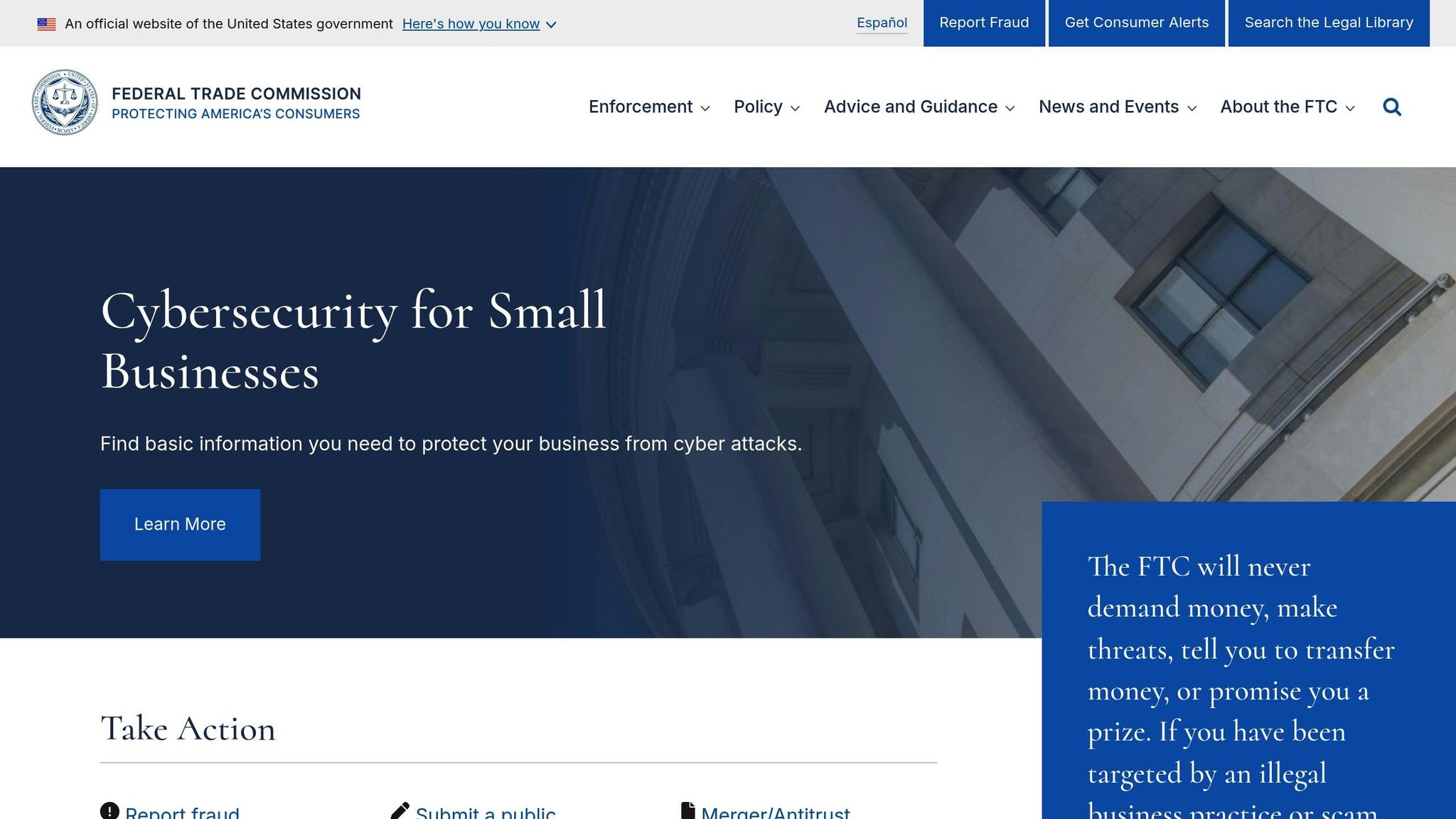
Cross-border data transfers are a major challenge in telemarketing, with increasing legal scrutiny and penalties for non-compliance. Recent cases highlight the risks of mishandling consumer data, especially when transferred internationally. Telemarketers face stricter regulations like GDPR, CCPA, and others, requiring clear consent, transparency, and robust safeguards.
Key takeaways:
- GDPR fines have exceeded €6.6 billion since 2018, including a €1.2 billion penalty on Meta in 2023.
- U.S. enforcement has intensified, with the FTC imposing $178 million in penalties for telemarketing violations.
- Cases like IAB Europe and Paddle.com show the growing accountability for data misuse.
Failure to comply can lead to fines, operational restrictions, and loss of consumer trust. Companies must prioritize consent management, respect opt-outs, and ensure compliance with global data laws to avoid severe consequences.
Major Legal Cases on Cross-Border Data Transfers in Telemarketing
Several key legal cases have shaped the rules surrounding cross-border data transfers in telemarketing, highlighting the importance of compliance with data protection laws.
IAB Europe and the GDPR Joint Controller Ruling

In 2025, the Belgian Market Court issued a ruling that redefined how EU consumer data is handled in cross-border transfers. The court examined IAB Europe’s Transparency and Consent Framework (TCF), focusing on whether the consent data strings (TC Strings) qualify as personal data under the GDPR. The ruling determined that TC Strings, when combined with IP addresses, indeed qualify as personal data. It also declared IAB Europe a joint controller for processing such data under GDPR guidelines.
The court found several GDPR violations, including:
- Lack of a valid legal basis for processing data through TC Strings.
- Insufficient transparency regarding how consumer data was used.
- Failure to conduct mandatory Data Protection Impact Assessments (DPIAs).
Initially, the Belgian Data Protection Authority imposed a €250,000 fine on IAB Europe. However, this fine was later partially overturned on procedural grounds. For telemarketers, this case emphasizes the need for strong consent mechanisms when using advertising frameworks involving cross-border data transfers. It also serves as a warning for international scrutiny of data handling practices.
Texas DTPA and Class Action Lawsuits
In September 2023, the Guangzhou Internet Court ruled against a French international hotel group for violating consent requirements when transferring a Chinese customer’s personal data abroad. The data included sensitive details such as the customer’s name, phone number, email, postal code, address, nationality, and bank card information. The court found that the company had failed to obtain separate, explicit consent before transferring this data to third parties outside China.
As a result, the court ordered the hotel group to:
- Delete the plaintiff’s personal data.
- Issue a private apology.
- Cover CN¥20,000 (approximately US$3,000) in reasonable expenses.
However, claims for additional economic losses were denied. This ruling underscores the importance of securing explicit consent for cross-border data transfers, a lesson with broader implications for telemarketers operating internationally.
FCC and FTC Enforcement Actions

In the U.S., enforcement against cross-border data violations has intensified. The FTC has pursued 151 enforcement actions targeting companies for violations such as Do Not Call breaches, robocalls, and spoofed caller ID. These efforts have resulted in over $178 million in civil penalties and $112 million in restitution.
One notable case involved Paddle.com Market Limited, a U.K.-based payment processor. In June 2025, the FTC fined Paddle $5 million and permanently banned the company from processing payments for tech-support telemarketers. The case highlighted how the company facilitated deceptive tech-support schemes by providing access to the U.S. payment system.
"Paddle provided foreign-based tech-support schemes with access to the U.S. payment system, allowing these companies to harm consumers", said Christopher Mufarrige, Director of the FTC’s Bureau of Consumer Protection.
Adding to the complexity, the DOJ’s Data Security Rule, effective April 8, 2025, restricts cross-border data transfers with certain countries, including China, Cuba, Iran, North Korea, Russia, and Venezuela. Noncompliance can result in severe penalties, with civil fines exceeding $350,000 per violation and criminal penalties of up to $1 million or 20 years’ imprisonment for willful violations.
Another significant case, Bindl v Commission, saw the European Court of Justice order the European Commission to pay €400 in damages to a German citizen. The case involved the transfer of the citizen’s IP address to U.S.-based Meta without adequate safeguards in March 2022. The court held the Commission responsible for enabling the transfer without proper protective measures.
These cases collectively highlight the growing accountability for data handlers and the serious consequences of noncompliance with cross-border data regulations.
Case Outcomes and Their Impact on Telemarketing
The recent legal decisions emphasize the growing financial and operational risks for telemarketing companies involved in cross-border data handling. These rulings show a clear trend: penalties for violations are becoming harsher, and operational restrictions are tightening. Here’s a closer look at the penalties and their implications.
Violations related to cross-border data transfers can result in significant fines and other consequences. For instance, Department of Justice (DOJ) regulations allow for civil fines up to the greater of $368,136 or twice the transaction’s value. In cases of willful breaches, penalties can climb to $1 million, accompanied by up to 20 years of imprisonment. Similarly, violations of the Telemarketing Sales Rule (TSR) can incur fines of up to $50,120 per infraction, along with mandatory restitution and additional restrictions. Under the Telephone Consumer Protection Act (TCPA), businesses face fines ranging from $500 to $1,500 for each unsolicited call or text sent to consumers.
A notable example occurred in October 2023, when a federal judge ruled against Day Pacer, LLC and Edutrek, L.L.C. for making millions of illegal telemarketing calls to numbers listed on the Do Not Call Registry. These companies had acquired contact data from job-search platforms to promote unsolicited educational services, resulting in approximately 40 million calls to registered numbers.
"The court found that the defendants knowingly violated the Telemarketing Sales Rule, citing evidence that the defendants had ignored repeated complaints from consumers and warnings from business partners".
The court imposed injunctive relief and civil penalties on the companies, with the final penalty amount yet to be determined.
Case Comparison Table
Below is a summary of the Day Pacer/Edutrek case and its implications for telemarketing operations:
| Case | Jurisdiction | Key Violation | Penalty/Outcome | Impact on Telemarketing |
|---|---|---|---|---|
| Day Pacer/Edutrek | U.S./FTC | TSR violations and Do Not Call breaches | Pending penalty determination; injunctive relief | Stricter compliance monitoring required |
These legal outcomes have forced telemarketing firms to rethink their compliance strategies. Many are now conducting more thorough audits of their vendors and partners to ensure strict adherence to data transfer regulations. This is especially critical for operations involving countries like China, Russia, Iran, North Korea, Cuba, and Venezuela.
Regulatory scrutiny is also increasing at the state level. By July 31, 2025, 16 states will have enacted comprehensive data privacy laws, presenting additional compliance challenges for businesses. These laws demand that companies reassess their data handling practices and strengthen protections for consumer rights.
As the regulatory environment continues to shift, telemarketing companies are being pushed to implement ongoing monitoring of their data flows. Vendors must now certify compliance with DOJ restrictions in their contracts to avoid potential violations. These cases serve as a stark reminder: non-compliance in data transfer practices can result in severe financial penalties and operational disruptions, fundamentally reshaping how businesses operate in the telemarketing industry.
sbb-itb-a8d93e1
Compliance Guidelines for Telemarketers
Having a solid compliance plan isn’t just a nice-to-have for telemarketers – it’s a necessity. Without it, companies risk hefty fines and major operational setbacks. In fact, a staggering 90% of call centers admit they fall short on compliance when it comes to data privacy and customer consent. Cutting corners simply isn’t an option.
Getting Consent and Being Transparent
The first step to staying compliant is securing clear and informed consent from consumers. This means telemarketers need to be upfront about why they’re collecting personal data and how it will be used. Consent should be explicit, whether it’s through opt-in forms on websites or written agreements. These agreements should outline the types of calls the consumer can expect and clarify how their information might be handled, especially if it crosses borders.
Equally important is maintaining systems that accurately track and update consent records. This minimizes human error and ensures compliance during audits. Detailed documentation of all telemarketing activities, including proof of consent, is critical – especially when dealing with regulations like GDPR or cross-border data transfers, where multiple jurisdictions may scrutinize the same records.
Handling Opt-Outs and Consumer Rights
Respecting opt-out requests is another cornerstone of compliance. When consumers withdraw their consent, telemarketers must immediately stop all communications and update their databases to reflect the change. Making opt-out mechanisms simple and accessible is key to ensuring consumers can exercise their rights without hassle.
Keeping thorough records of opt-out requests – such as the date, time, and method of each – is crucial for regulatory reviews. Additionally, training employees on privacy laws and best practices equips them to handle these requests efficiently and respectfully. These efforts not only protect against violations but also build trust with consumers.
Using Consumer Protection Platforms
Consumer feedback platforms can act as an early warning system for compliance issues. Tools like ReportTelemarketer.com (https://reporttelemarketer.com) allow consumers to report violations of telemarketing laws. These platforms investigate complaints, issue cease-and-desist letters, and even file formal complaints when necessary.
For telemarketers, monitoring these platforms provides valuable insights into potential compliance gaps. Addressing issues early can prevent them from escalating into costly regulatory actions. Publicly reported violations also encourage better practices across the industry. Beyond avoiding fines, these platforms can help consumers recover money from companies that fail to follow the rules, adding another layer of accountability.
Routine compliance audits are essential to staying ahead of potential issues. Companies should monitor their data flows continuously and require vendors to certify adherence to data transfer regulations in their contracts. This proactive approach helps identify and address problems before they lead to severe penalties.
Key Takeaways and Future Outlook
Recent cases highlight an undeniable global trend: regulators are doubling down on cross-border data transfer compliance. Telemarketing companies can no longer afford to treat this as a secondary concern. The legal decisions discussed show that failing to secure proper consent for marketing data transfers can lead to serious consequences, with no company being exempt from scrutiny.
The stakes are high. Penalties for non-compliance are escalating, ranging from relatively small fines to multi-million-dollar sanctions. These cases emphasize that ignoring compliance is not just risky – it’s becoming financially unsustainable. Regulatory enforcement is also evolving, with authorities across different regions increasingly sharing information and aligning their efforts to address violations.
"If you’re a foreign adversary, why would you go through the trouble of complicated cyber intrusions and theft to get Americans’ data when you can just buy it on the open market or force a company under your jurisdiction to give you access?" – Deputy Attorney General Todd Blanche
This statement reflects growing U.S. concerns, further evidenced by the Department of Justice’s recent Final Rule on bulk data transfers, which will take effect on July 8, 2025.
The regulatory environment is becoming more complex, with telemarketing companies needing to navigate varying requirements across jurisdictions. Laws like China’s PIPL, the EU’s GDPR, and U.S. state regulations such as the CCPA demand clear policies on consent, transparency, and data localization. Companies must now specify exactly which parties and countries will access personal data. This fragmented framework requires adaptable compliance strategies to ensure smooth operations.
AI-driven telemarketing faces even greater scrutiny. Automated data processing now demands separate impact assessments, and companies can no longer justify marketing activities as "necessary for contract performance" without explicit consent. These changes force telemarketing firms to rethink how they collect and process data, requiring a more structured and transparent approach.
The push for stricter enforcement is unlikely to let up anytime soon. Companies that adopt proactive compliance measures can gain a competitive edge, while those that delay risk severe operational and financial setbacks. Regulators have demonstrated their readiness to impose significant penalties on organizations that put convenience over consumer protection.
The message for telemarketing businesses is clear: building a strong compliance framework isn’t optional – it’s essential for long-term success. The cases discussed serve as a stark reminder that failing to prioritize compliance can lead to costly consequences.
FAQs
What challenges do telemarketing companies face when transferring data across borders under current regulations?
Telemarketing companies often grapple with the complexities of cross-border data transfers, thanks to the patchwork of international laws and privacy standards. Meeting data localization rules, staying compliant with strict privacy regulations, and handling restrictions on sensitive data transfers can be a daunting and time-intensive process.
On top of that, there are security risks to consider during these transfers, alongside potential political or economic challenges that could further complicate operations. Non-compliance isn’t just risky – it can lead to steep fines or even disrupt telemarketing campaigns entirely. To navigate these hurdles, businesses must adopt lawful transfer frameworks, implement strong security measures, and establish comprehensive compliance policies that align with all relevant laws.
How have recent legal cases impacted telemarketing firms’ compliance with data transfer and payment regulations?
Recent legal cases, like those involving IAB Europe and Paddle.com, have brought attention to key compliance challenges for telemarketing firms. The rulings against IAB Europe highlighted the importance of transparent data handling and clear consent mechanisms under GDPR guidelines. While GDPR is specific to Europe, its influence often extends globally, prompting U.S. companies to scrutinize cross-border data practices to steer clear of legal trouble.
Meanwhile, Paddle.com’s $5 million settlement with the FTC over deceptive tech support scams underscores the critical need for payment processing oversight and fraud prevention measures. This case serves as a clear warning for telemarketing firms to prioritize strong risk management systems to maintain ethical standards and avoid hefty penalties.
These examples underline the increasing focus on data privacy and payment security, pushing telemarketing businesses to adopt thorough compliance strategies. Doing so not only minimizes legal risks but also fosters greater consumer confidence.
What steps can telemarketing companies take to comply with global data protection laws and avoid legal penalties?
To stay aligned with global data protection laws and steer clear of hefty penalties, telemarketing companies need to implement strong technical and organizational safeguards. This means encrypting sensitive data, securely storing customer details, and setting up strict access controls to limit who can view or handle this information. On top of that, regular employee training on data privacy practices is a must to keep everyone informed and vigilant.
Companies also have to meet specific legal obligations. For example, they must identify valid reasons for processing personal data, ensure records are accurate and up to date, and comply with U.S. laws like the Telephone Consumer Protection Act (TCPA) and Do Not Call (DNC) rules. These regulations bar calls to numbers listed on the National DNC Registry and require telemarketers to provide clear, upfront disclosures during their calls.
For businesses operating across borders, it’s crucial to establish secure methods for transferring data internationally while adhering to any restrictions on cross-border data sharing. By taking these steps, telemarketing companies can not only avoid fines but also build and maintain trust with their customers.